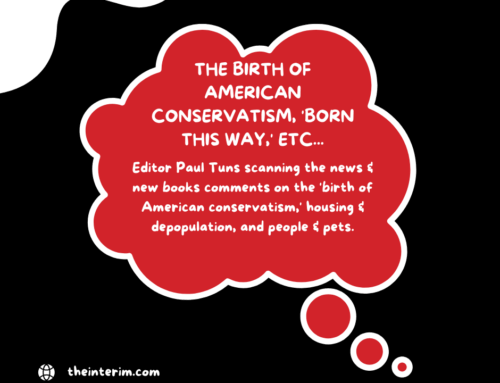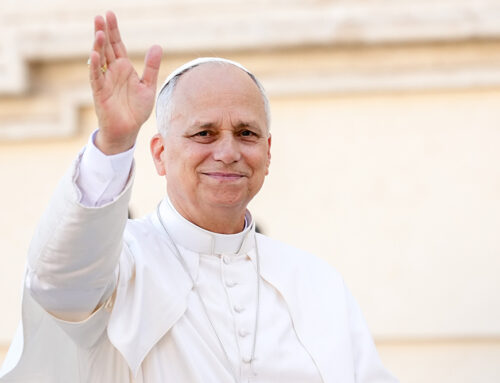Faith and Life
“God so loved the world that He sent His only Son, that we might have life through Him.” – First Letter of St. John
There is a story, really a parable about a very rich man who had a little daughter of 6 or 7, whom he loved with all his heart. When Christmas came around, he wanted to really let her know how much he loved her, so he bought her a very expensive pearl. He wrapped it up in coloured paper and bound the parcel with a lovely red ribbon. On Christmas morning he gave it to her and waited for her reaction. She slowly opened the parcel. When she came to the pearl, she looked at it and put it aside. Then she tied the ribbon around her hair and began to make figures with the coloured paper. She went to her room to look at herself, leaving the pearl aside.
Every parable has a lesson. I think the lesson of this one is this: Christmas comes to us well wrapped up in the trappings of this world–the Santa Claus Parade, the parties, the gifts, the music, the eating and drinking. It is more than possible that in spite of our Faith, we can be so distracted by all the material externals that we miss the real meaning of Christmas, the Pearl of great price, the Christ Child in the manger.
Real impact?
Of course if we were asked directly what Christmas is all about, we would say, “The birth of Christ.” But how much real impact has that stupendous happening on our thinking as we rush around to get everything ready for Christmas? And so I would like to reflect a little on the meaning of this Event compared with which every other event in human history pales into utter insignificance.
Who was this Child that lay in the manger in Bethlehem some two thousand years ago? For us Christians there can only be one answer. He was and is God–as really and truly God as is God the Father and God the Holy Spirit.
Christmas is the greatest story ever told, a story which surpasses every other story as the ocean surpasses a stream or as the sun outshines the flicker of a candle. So, suppose we span the centuries in our imagination and come to Bethlehem and see Him whose birth the angels sing.
Holy family image
Having bowed our heads in order to enter the cave or stable, what do we see? A young man. St. Joseph was not old as pictures usually portray him, but a young Jew in his early twenties. With him is a young woman–probably of more than ordinary beauty–and in the manger, a Baby. According to a tradition based on a verse of the Prophet Isaiah, an ox and a donkey were also in attendance, chewing quietly and probably a little annoyed at these unexpected visitors. And we believe that this Baby was the God who created the universe. Are we insane? No, we are not! For this Baby divides history into two parts–the events which happened before his birth and the events that occurred after it. B.C. means before Christ and A.D. means in the Year of the Lord.
All the Old Testament looked forward to this event. All the New Testament is based on it. Every official document of Church or State bears witness to the Birth of Christ for it must be dated to be valid. The date 1997 means roughly nineteen hundred and ninety-seven years since a Baby was born in a stable at Bethlehem. On what do we base this stupendous claim that this Babe was the Eternal God, the King of Heaven and Earth? We could quote many texts of scripture, but, perhaps, the most pertinent is in the very first chapter of the Gospel of St. John, “In the beginning was the Word and the Word was with God and the Word was God and the Word was made flesh and lived among us.”
But why did Our Lord come amongst us in such a lowly manner. Could He not have come some other way? Of course He could have. He could have come as He tells us He will come at the end of the world, with great power and majesty and all the angels with Him. But why did He come as a tiny Babe bereft of power and majesty?
I could best explain the reason with a parable-like story which is completely un-theological and reduces God to human terms. Let us imagine God the Father, up in Heaven, calling God the Son one day and saying, “Son, look down on earth. There they are eating and drinking and buying and selling: and killing and living as if there were no other life. They have been like that since Adam defied Me in the Garden, and rejected My friendship. Now I want You to go down on earth and bring them back to My friendship and teach them to adopt My values.”
Human nature
And the Son says, “You mean You want Me to go down and take over the world and show them by force that they must obey You?”
And God the Father says, “No, My Son. That would never do. I want You to become really one of them. You are a Divine Person with a Divine Nature. You are God, just as I am. But I want You, while remaining God to take on a human nature which makes You a man just as real as they are. So You will be a Divine Person with two natures, the Divine Nature which makes You God and a human nature which makes You a man. Men, in their blind pride, think that riches are the most important things in the world; so I want You to be poor. Men think that power is of paramount importance; so I want You to be weak. Men are convinced that un-trammelled pleasure leads to true happiness; so I want You to show them, by suffering, how wrong they are. Men think that freedom is to be found by disobeying My laws; so I want You to be totally obedient to all My commandments.
“But I warn You, My Son, that Your obedience will bring You into conflict with the powers that be, both the religious authorities and the civil authorities and they will hound You to a terrible death.
“I am appointing You as the Second Head of the human race to take the place of the First Head, Adam, who failed through pride. I will accept Your death in obedience and humility as reparation for the pride and disobedience of Adam and as a result I shall re-establish friendship with men and open to them the Gates of Heaven. Before You return to Heaven after Your Resurrection, I want You to establish a Church on earth through which You will continue to teach and sanctify all those who will listen to You and accept Your values for You will be for them the Way and the Truth and the Life and through You, working in Your Church, they will attain the eternal glory of Heaven.”
This, in very human terms is the story of our Redemption and the meaning of Christmas, the love of God for us.
Christmas is a challenge to our material world. Here is something which should make us reflect. Two apparently completely different types of people found their way to the feet of the Babe of Bethlehem. First came the shepherds, almost certainly not only poor but unlearned. The second group was that of the Wise Men. They were not kings as the Middle Ages artists portrayed them, but men of science–astronomers, men who studied the movements of stars, the most learned men of their age. They, too, came to the feet of Christ. How different these two groups appear to be at first assessment. But they had two things in common. First of all they were humble and unworldly. Secondly, because they were humble, they were seekers of truth. Looking out across the world today we see that only the scenery has changed. For Bethlehem read Boston; for Nazareth read New York; for Jerusalem read Toronto. The actors are really the same.
The stage of life
Christ still divides the world of men and things–those who are for Him and those who are against Him. There is no comfortable fence. And the actors in the drama of Redemption are the same–the rich and the poor; the proud and the humble; the worldly and the unworldly–we are all there on the stage of life. And in the spiritual cave there is room for all of us if only we will enter. But there is just one common passport. In order to enter the Cave of Bethlehem people had to bow their heads. In order to enter the Spiritual cave we also must bow our heads by being humble. Unless you become as little children, you cannot enter the Kingdom of Heaven. True humility is the only passport to the feet of the Christ Child
This article originally appeared December 1997.





